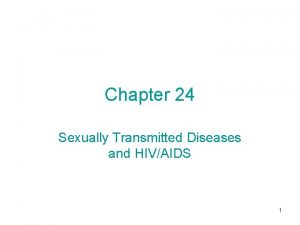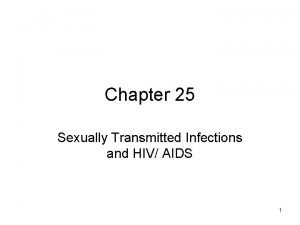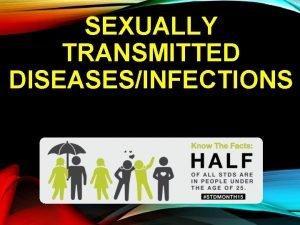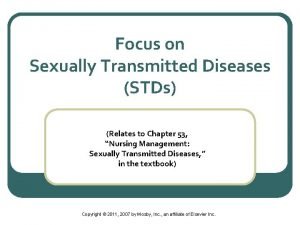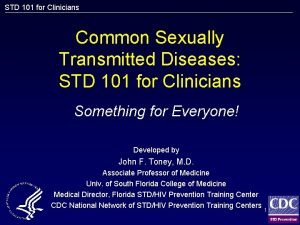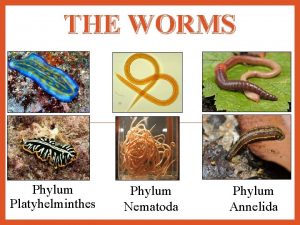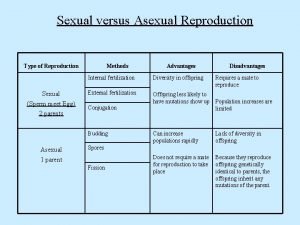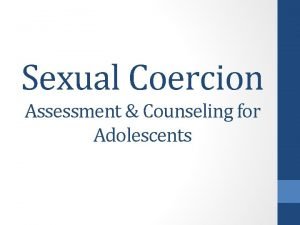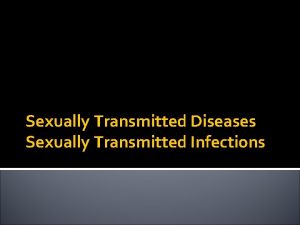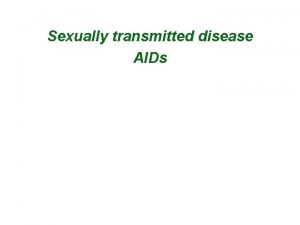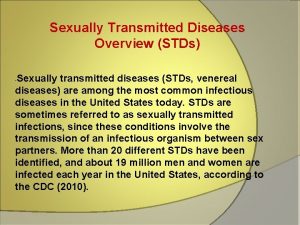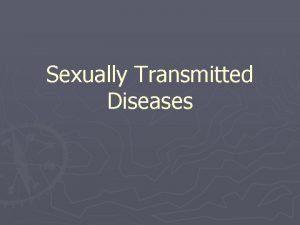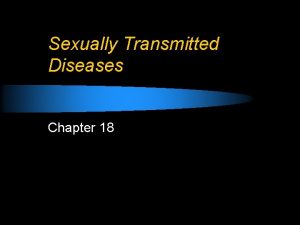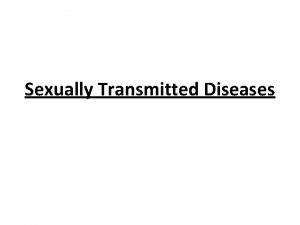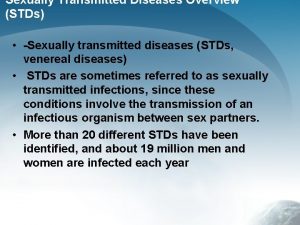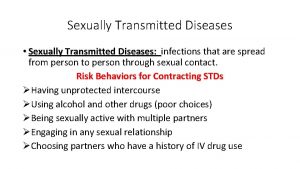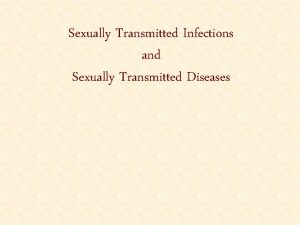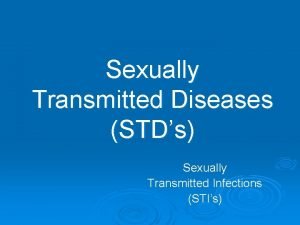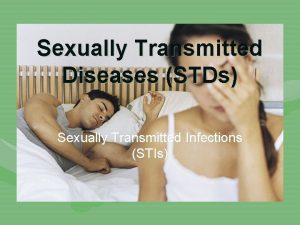Sexually Transmitted Diseases and AIDS SEXUALLY TRANSMITTED DISEASES














- Slides: 14

Sexually Transmitted Diseases and AIDS

SEXUALLY TRANSMITTED DISEASES • Diseases that are passed from person to person during sexual contact are called STDs. • You can become infected with an STD by having sexual activity with an infected person. • STD’s are caused by viruses and bacteria.

AIDS- Acquired Immune Deficiency Syndrome • AIDS is an STD caused by the HIV virus. • HIV stands for human immunodeficiency virus because it attacks the immune system to cause AIDS is a serious breakdown in a person’s natural immunity against disease.

• HIV carries its genetic information in the form of RNA and like other viruses cannot reproduce without the help of host cells. • The HIV virus’s host cells are Thelper cells, which are specialized cells that make up the immune system.

HOW IS HIV IS SPREAD? • HIV is spread through the exchanges of blood, semen, breast milk, and vaginal secretions by sharing needles or participating in unprotected sexual activity. • The HIV virus can live in the human body for years before actual symptoms appear.

• Using condoms properly during sexual intercourse can reduce the risk of contracting AIDS and other STD’s, but does not eliminate the risk as some STD’s are small enough to pass through condoms.

• There are only two completely effective ways to protect yourself from getting AIDS through sexual activity: 1. To practice abstinence (no sexual activity until you are married). 2. To have one uninfected partner who is faithful to you.

THE SYMPTOMS OF AIDS • The major problem that occurs in a person infected with AIDS is the defect in the immune system. • This allows a variety of other diseases to attack the body and ultimately cause death.

• The body will not be able to overcome simple infections such as common colds because of the defects in the immune system.

THREE STAGES OF AIDS • Asymptomatic Infection- the person is infected but shows no symptoms. This is person can easily pass the virus on to other people and not know it.

• AIDS-Related Complex (ARC)- These people develop a characteristic set of symptoms over a period of months/years. • They will test positive for the HIV virus and can have the following symptoms: loss of appetite, extreme loss of weight, persistent fever, night sweats, diarrhea, persistent tiredness, and lack of resistance to infection.

• AIDS-The Last Stage- This occurs once a person has a bad infection and the immune system is unable to fight it. • There are certain illnesses that most people with AIDS die from, which include pneumonia and a type of vascular cancer.

WHO HAS STD’s? • The Center for Disease Control estimates that over 33, 000 cases of STD’s occur everyday. • One out of every 4 people between 15 and 55 years of age will become infected with at least 1 STD within their lifetime. • Over 80% of all STD’s are found in individuals between 15 and 30 years of age. • STD’S can cause fertility problems in males and females

WHO’S RESPONSIBLE? • ANYONE can contract an STD no matter your age or gender. • “It’s not who you are, but what you do that counts. ” • Therefore it is up to YOU to make good choices in regards to your actions as you grow up!!!!!!
 Chapter 24 sexually transmitted diseases and hiv/aids
Chapter 24 sexually transmitted diseases and hiv/aids Chapter 25 sexually transmitted infections and hiv/aids
Chapter 25 sexually transmitted infections and hiv/aids Chapter 24 lesson 1 sexually transmitted diseases
Chapter 24 lesson 1 sexually transmitted diseases Sti std
Sti std Sexually transmitted diseases
Sexually transmitted diseases Sexually transmitted disease
Sexually transmitted disease How do sponges reproduce sexually and asexually
How do sponges reproduce sexually and asexually How do whales reproduce sexually
How do whales reproduce sexually Roundworms segmentation
Roundworms segmentation Do sea urchins reproduce sexually or asexually
Do sea urchins reproduce sexually or asexually Unokais
Unokais Coerced
Coerced Reproduction of protists
Reproduction of protists Sexual abuse awareness training quiz answers
Sexual abuse awareness training quiz answers Oral and aboral surface of starfish
Oral and aboral surface of starfish
